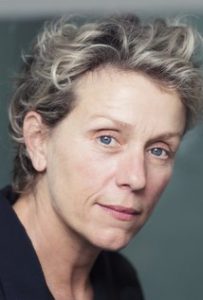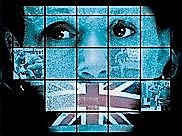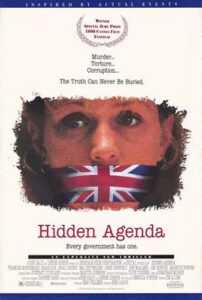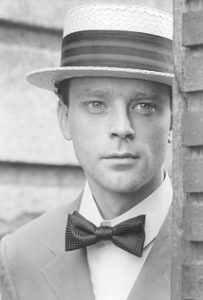Hidden Agenda **** (1990, Frances McDormand, Brian Cox, Brad Dourif, Mai Zetterling, Jim Norton) – Classic Movie Review 4,147
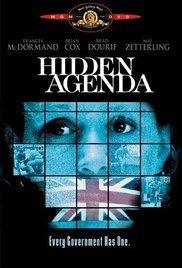
Ken Loach’s distinguished, controversial 1990 political thriller Hidden Agenda stars Brian Cox as a tough police detective investigating the murder of an American human rights lawyer in Belfast, with the help of the man’s girlfriend (Frances McDormand).
Director Ken Loach’s distinguished and controversial 1990 Irish political thriller Hidden Agenda, written by Jim Allen and inspired by actual events, won the Jury Prize at the Cannes Film Festival in 1990 and was nominated for the Palme d’Or. It centres on the story that follows the arrival in Belfast of a tough, no-nonsense English police detective (Brian Cox) to investigate the murder of an American human rights lawyer and activist (Brad Dourif), which he does with the help of the dead man’s assistant and girlfriend (Frances McDormand).
As the duo try to find out the truth, the trail leads to evidence of a huge cover-up after they find the lawyer had an audio tape with him, exposing political manipulations at the highest levels of government. It transpires that the lawyer’s killers are from the British security services.
Hidden Agenda is a complex, exciting, adult film, delivered with great punch and at a dynamic pace by director Loach, who attends to the action thrills while opening the audience’s eyes to some of the uncomfortable events in Ireland. The bluff Cox gives a tremendously powerful performance as the high-ranking British police investigator Peter Kerrigan, and McDormand touches the emotions as Ingrid Jessner. Loach is certainly partisan and full of well-aimed passion that angered those who did not share his views.
Also in the cast are Mai Zetterling, Jim Norton, Bernard Bloch, Bernard Archard, John Benfield, Patrick Kavanagh and Maurice Roëves.
The production was set up in 1987 at Columbia Pictures, but it was cancelled when David Puttnam was ousted as the studio boss.Loach eventually found financial backing with Hemdale Film Corporation under John Daly.
Frances McDormand and Brad Dourif also starred in Mississippi Burning (1988).
Hidden Agenda ignited uproar at the Cannes Film Festival in May 1990. Britain’s tabloid journalists formed a deputation to the festival director Gilles Jacob, demanding that it be withdrawn, but, Loach said: ‘He took great delight in laughing them from the room.’
At the press conference for the film. Alexander Walker, Northern Irish film critic of the right-wing London Evening Standard, attacked the film, denouncing it as IRA propaganda and denying the truth of the events it shows.
Loach said: ‘Then, when we tried to answer Walker, we were shouted down by a group of British journalists. Then they in turn were shouted down by members of the international press. One of them accused Walker of representing the most reactionary elements in the British press. As someone said at the time, there’s a lot of competition.’
Walker continued his virulent attacks on the film in his newspaper at the time of its UK release on 21 November 1990.
Despite all the controversy, which provides valuable publicity and usually leads curious audiences into cinemas, it did not fare well at the box office. Costing £3 million, made only £141,050 in the UK, and took $1,030,938 overall.
Margaret Thatcher was the right-wing Conservative Prime Minister of the UK from 4 May 1979 to 28 November 1990.
The cast are Frances McDormand as Ingrid Jessner, Brian Cox as Peter Kerrigan, Brad Dourif as Paul Sullivan, Maurice Roëves as Captain Harris, Ian McElhinney as Jack Cunningham, Mai Zetterling as Moa, Michelle Fairley as Teresa Doyle, Jim Norton, Bernard Bloch, Bernard Archard, John Benfield, Patrick Kavanagh, and socialist politician John McDonnell as Labour MP.
© Derek Winnert 2016 Classic Movie Review 4,147
Check out more reviews on http://derekwinnert

